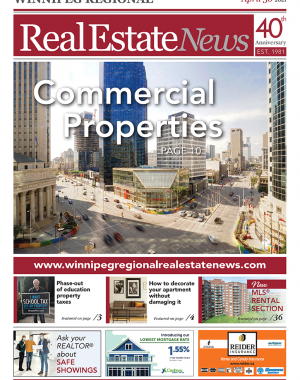The COVID-19 pandemic has flipped the Canadian rental market on its head. Cities like Toronto have seen skyrocketing downtown rental listings and declining prices, making it an ideal market for renters.
Despite these unusual circumstances, prospective tenants can benefit from a wider variety of options on the market. Increased levels of inventory, coupled with dropping prices, have shifted the market’s balance in favour of renters, providing them with more listings to choose from at discounted prices. Like with resale transactions, both landlords and tenants can recruit the support of a REALTOR® to assist them through the rental process.
“A lot of tenants that I work with have never used a real estate agent to find a rental before. They’ve always done it on their own,” says Conrad Rygier, a broker and REALTOR® with Right at Home Realty Inc in Toronto. “There are certain things that, [when] working with a REALTOR®, might be a little bit different than finding a rental in an apartment building that’s privately managed or approaching a person directly who has a property for rent.”
If you’re on the hunt for a new apartment, or just want to get a better understanding of leasing terminology, Rygier helps us to break down five essential terms everyone should know before signing a rental agreement. Note some leasing terminology or rules vary by province.
Lease term
A lease term, referred to as the term of the tenancy agreement, is the duration the lease agreement is in effect.
A fixed-term tenancy requires the tenancy start and end on a specific date outlined in the agreement. The tenant is not required to move out at the end of the lease term or renew their agreement. Instead, they may choose to live in the apartment on a month-to-month basis if their agreement is on a fixed-term, or agree to enter into a new agreement altogether with the landlord.
Periodic tenancies also exist, where the agreement has a start date but no end date until a tenancy termination is provided.
Tenancy termination
If a tenant wishes to terminate and leave their lease agreement, they can provide notice to end tenancy. This notice is often required to be served in writing many weeks before the tenant intends to move out, or their fixed-term lease is expected to end. For example, in Ontario, tenants are required to provide 60 days’ notice if they’re leaving a monthly or fixed-term tenancy. In Manitoba, tenants can give 30 days’ (one rental payment period) notice to vacate.
In cases where the tenant wishes to leave their tenancy before the end of the fixed-term agreement, Rygier says there are a couple of options.
“If, for whatever reason, you need to leave early, then subletting is essentially your only real, viable, legal option,” explains Rygier. “Your other option, and it’ll be entirely at the whim of the landlord, is to speak to the landlord and see if you can mutually agree to end the lease early.
In some cases, a tenant may be able to give less than one rental payment period notice. A tenant can give five days’ notice to move out if their health or safety is at risk. If the rental unit is in such bad condition that it is impossible for them to continue to live in it, they may be able to move out immediately. A tenant should contact the appropriate inspection agency in these situations.
Sublet
In the event a tenant wants to move out of their rental unit temporarily, but not terminate the tenancy agreement, they may propose enlisting a sublet to take over the unit.
A sublet, or sub-tenant, lives in the tenanted unit until a specified date, but this does not change the existing lease conditions between the landlord and tenant. While the tenant recruits and chooses the sublet, Rygier explains the landlord gives the final approval on the sublet to ensure they are suitable.
“I’ll include a condition [in the lease] that says you have the right to sublet, but the landlord has the ultimate right to approve that person or reject that person,” says Rygier. “The landlord won’t help you find somebody to sublet your property, but they do need to approve that person prior to occupancy.”
Deposit
A deposit is an amount of money put forward as an installment on the lease agreement, and used as future payment for a portion of the lease. In some cases, a lease agreement may contain other types of refundable deposits. Deposit amounts and rules are different in each province.
In Ontario, the Standard Form of Lease agreement introduced in 2018 only requires one month’s rent as a deposit, which is used as a pre-payment towards the last period of the tenancy and is collected on the day the tenancy begins.
Meanwhile, in Manitoba, a deposit entails half a month’s rent payable as a security deposit, and one month’s rent for a pet damage deposit. In British Columbia, neither a lease’s security deposit and pet damage deposit can exceed one-half of the monthly rent.
Security and damage deposits are not legal in Ontario, but refundable key deposits are. Landlords must also pay interest on the deposit to the tenant every year. A REALTOR® can help tenants and landlords to determine which provincial deposits are appropriate in their lease.
In good repair
Unlike resale agreements, leases do not provide an inspection clause that covers the property’s physical condition. However, leases do set the groundwork for the responsibilities of the landlord and the tenant to keep the property in good repair; a standard that addresses the maintenance and repairs the unit requires.
Rygier explains the lease agreement can specify the procedure for when appliances break down, or list any work requested to be completed prior to the tenant’s occupancy.
“When I represent a tenant, I essentially make sure that everything we want done, or want to make sure, is instituted into the agreement,” says Rygier. “If we need work done on the property, it has to be specific and it has to have a time frame.”
Launching this week, you can find local MLS® rental properties on page 36 and on www.winnipegregionalrealestatenews.com marketed by local professional REALTORS®.
— Realtor.ca



